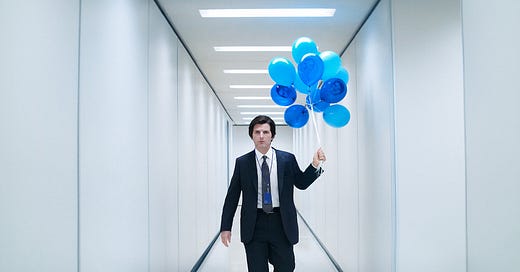Hello new subscribers! Thanks for signing on last week. Here’s my first bit of content for paid subscribers. It’s a shorter piece with hotter takes. Consider it a model of the kind of stuff I’ll be doing behind the paywall going forward. If that’s enticing, consider upgrading!
Recently, my dear friend Sam wrote a piece about The Pitt, the new medical drama on Max that has captured your heart and the hearts of everyone you know with the eccentric black magic alchemy that can only be described as “making a normal TV show.” In it, she took a swipe at some other of-the-moment programs to which The Pitt seems to stand in opposition:
This is the tension at the heart of The Pitt: It is “trash TV” executed with the care of something finer. This is great for me, because I love the conventions of scripted trash far more than those of “prestige” television. I prefer corny dialogue and infallibly noble characters and broad emotional manipulation. It is rare, especially in the age of over-produced puzzle-box themeslop like Severance and White Lotus, to get a show so unabashedly committed to an older mode of television.
Now I don’t agree with all of what she’s saying here, but I think she’s broadly correct that The Pitt succeeds because it is a razor-sharp execution of a shopworn mold for television production. But people on Twitter really seemed to take issue with it, particularly that last sentence. Some of what I saw was a familiar defensive crouch from a fannish perspective, some of what I saw was lashing out at a woman with the nerve to state an opinion that wasn’t couched in apology. I saw words like “smug” and “condescending” thrown around, too. But the use of the term “themeslop” caused the most consternation. How can a television show having themes be a bad thing?
The term really resonated with me, though. It precisely diagnoses a disease that’s all too common these days in movies and television and even games. These works insist so intently on being About Something that everything else is eclipsed; it doesn’t matter how it is About it, and certainly not why. They often feature laborious metaphors and allegories and strain so hard to make them visible that they stop being subtext. I like Severance, but it does sometimes feel like its impatience to communicate its satirical ideas about labor and corporations makes it get ahead of itself narratively, like it’s writing for the morning-after explainer posts rather than for the needs of the story.
What is themeslop? Here’s an incomplete list. The films of Alex Garland are themeslop. The films of Robert Eggers are themeslop. Everything Everywhere All At Once is themeslop. So is Promising Young Woman. Themeslop indie games flood the marketplace. The Last of Us games are lowkey themeslop, but their television adaptation is highkey themeslop. Ruben Östlund is a themeslop merchant. Sadly, so is Guillermo del Toro.






